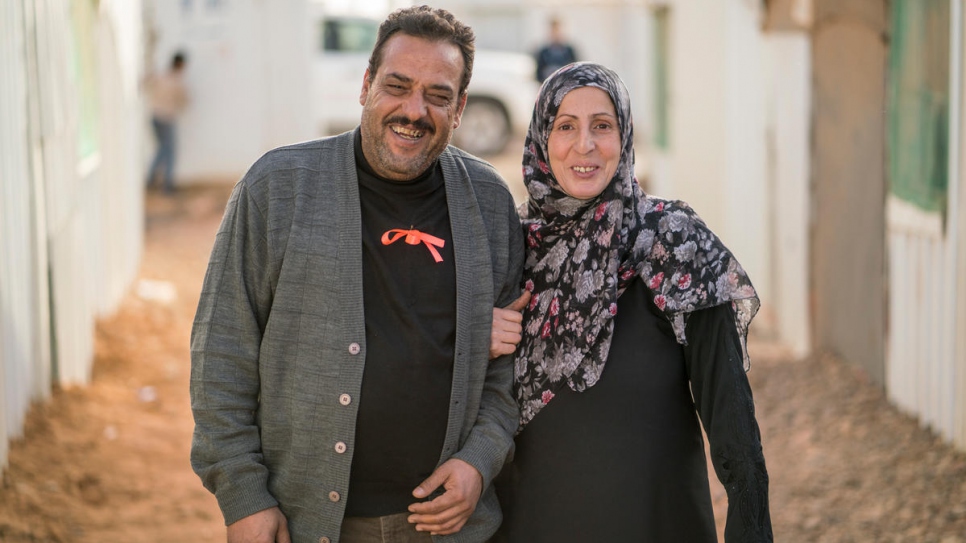Syrian refugee uses musical talent to fight disability myths
After losing his sight as a child, Ehsan found a love for music that he now uses to counter negative stereotypes in Azraq camp.
Syrian refugee Ehsan Al Khalili teaches music to a group of children in a UNHCR-funded community centre in Azraq refugee camp, Jordan.
© UNHCR Video: Houssam Hariri, camera / Rima Cherri, producer
Three days a week, the bustle of daily life in one corner of Jordan’s remote Azraq refugee camp is drowned out by the driving beat of a traditional “doumbek” drum, loudly accompanied by two dozen singing and clapping children.
Leading this joyful ensemble is 45-year-old Syrian refugee Ehsan Al Khalili, his hands a well-practised blur of movement across the drum skin. His music class is aimed at children with disabilities living in the camp, but is open to all and hugely popular, judging by how quickly the plastic chairs in front of him fill up at the start of each session.
Ehsan’s belief in the positive effects of music began during his childhood in the Syrian capital, Damascus. “When I was 11, I was riding a bicycle with friends and fell into a large construction hole in the street," he explained. "Head injuries caused nerve damage in my eyes and I lost my sight."
After quitting school and falling into depression, Ehsan made a conscious decision to begin a new life. He asked his father to buy him a cassette player and began listening to Egyptian songs, eventually teaching himself to drum by playing along in time with the music.
After enrolling aged 16 in a school for pupils with visual impairments, Ehsan joined a school band as its drummer and singer. He proposed that the band, whose male members were all blind, could play to female guests at traditional weddings where men and women remain separate, thus carving out a successful niche.
“From being a need... music became my profession."
Ehsan continued to work as a musician for several years, running his own band which played at restaurants, parties and weddings in the capital. “From being a need, then a hobby, music became my profession,” he said.
Aged 23, he married his wife Rabab, and music took a back seat after he found a job in a government office helping people with their passport applications. Following the outbreak of conflict in Syria in 2011, however, Ehsan lost his job. A year later, he was woken by Rabab one morning to the sound of explosions drawing nearer and nearer to their home.
- See also: Greece: A Paralympic Dream
The couple and their five children fled to Jordan and became refugees. They spent their first three years in exile living in towns and cities around the country and getting by on financial assistance provided by UNHCR, the UN Refugee Agency.
Ehsan often found life difficult in his new and unfamiliar urban surroundings. “There were days when I thought: ‘this is it, this is the end’. Sometimes I didn’t leave the apartment for weeks at a time.”
The World Health Organization estimates that 15 per cent of the world’s population has some form of disability. In situations of forced displacement, people with disabilities often face additional barriers to accessing services and have few opportunities to play an active role in their communities.
To mark the International Day of Persons with Disabilities on December 3, this year UNHCR is highlighting the positive effect people living with disabilities can have in their communities and workplaces when their abilities are recognized and barriers to inclusion are removed. In a statement, UNHCR head Filippo Grandi said people with disabilities forced to flee their homes face particular difficulties and said: "we need to make sure they are protected and supported."
Ehsan’s situation changed in 2015, when he and his family moved to Azraq refugee camp in Jordan’s barren north-eastern desert, home to more than 35,000 Syrian refugees.
“The best way to fight misconceptions is for people to see you engaged."
There he met Abu Hassan, a fellow resident who plays the oud – a traditional lute – and the two began playing music together “for the sheer joy of it”. The pair approached a UNHCR-funded community centre in the camp run by humanitarian organization CARE International, and suggested starting a music class for children, including those with disabilities.
“People with disabilities have talents that need to be expressed,” Ehsan said, adding that activities that take account of their needs are necessary to integrate people with disabilities fully into the community.
That was certainly the case for Ehsan himself, who said that becoming a music teacher has “allowed me to give something back to my community and become the person I’ve always wanted to be".
He hopes his example is helping to fight common misunderstandings about people with disabilities.
“The main struggle I’ve faced during my life is how other people treat me, like I’m somehow incapable,” he said. “The best way to fight misconceptions is for people to see you engaged in life. When they see me teaching or playing with the band, they begin to understand that I’m not defined by my disability.”





